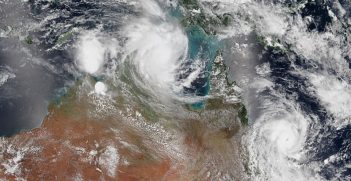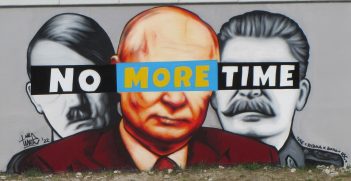Securitisation of Health or Medicalisation of War? Rethinking the Boundary of Security and Medicine

The Covid-19 pandemic has highlighted how far human health has been securitised, but this is just one event in the long and problematic relationship between the military and medicine. Their relationship is two-way, and modern medicine has influenced contemporary military security as we know it.
The COVID-19 pandemic brings with it the idea that “war metaphors… in public health communication and local responses may undermine efforts to control the virus” or reinforce the narrative of “sick people as “fighters,”” leading to the “attribution of guilt to a patient who does not recover.” The concern that implementing security-related ideas in other fields can cause suboptimal outcomes is genuine and valuable; they also demonstrate the perspective that public health is moving closer to the military. However, upon closer inspection, the two fields were never distant from each other – either linguistically, practically or socially.
Linguistics
The term “security” invokes a specific imagery, unlike what the term “health” would summon. On the one hand, the deluge of battle footage from the Ukraine invasion reinforces what we envisage of war: flashes of gunfire amid city ruins and tanks exploding from being hit by missiles. On the other, people in white gowns sew wounds and administer cures through syringes. However, these two images share many commonalities.
Linguistically, medicine employs many war-like analogies, such as “fighting cancer,” and the imagery of our immune system “battling” alien substances by “deploying” or “mobilising” lymphocytes. The military also borrows much from health. “Surgical strike,” a common term in security circles, was invoked by the preciseness and exactitude of surgery. Finally, some fall somewhere in between, for example: “operating theatres,” where doctors perform surgery and “theatres of operation,” where commanders plan and fight strategic battles. With that in mind, it is not security language that is bleeding into medicine but a constant exchange and borrowing between the two.
Practice
Medicine has always played a critical role in military conflicts. The absence of doctors and an adequate understanding of human health has, in many instances, decided the victor of battles and, in turn, wars. Diseases caused more deaths than combat in every war until the very late 19th century. Several armed conflicts also saw the use of diseases against opposing forces, from poisoning water sources with human bodies to providing smallpox-infected blankets. The act of neutralising (killing) an enemy is nothing but to worsen their health condition. With the purchase of hindsight, it is evident that sufficient medical infrastructure does give one side an advantage over the other. After all, medicine and warfare alike seek mastery over life and death. To simplify the equation of the battlefield, the side with more troops can hold more weapons, thus increasing its firepower. And the side with more advanced medicines and operating theatres can return more casualties to the battlefield. If George S. Patton is correct in saying that the US won wars by “making the [enemy] die for his country,” then having a sophisticated field hospital would make an invaluable contribution to not losing.
Despite their close relationship, the two fields only made an effort to meet each other in the First World War. Even then, medical professionals faced many barriers to prolonging soldiers’ lives, such as poorly designed field hospitals, not enough ambulances, the disreputation of medical officers in the officer corps, and the reluctance of soldiers to sanitise. Only later did the general staff recognise the significance of preserving their troops’ health and incorporating medical staff’s demands into their battle plans. This is the first time the two fields have direct contact. However, it is also possible, even though more challenging, to prove that there are informal connections. As many military commanders have health conditions, they have to keep their doctors close at hand. Napoleon spent his time in exile with Dr Barry O’Meara tending to numerous of his health complications. Dwight D. Eisenhower had a similar relationship with General Howard Snyder, who was his personal physician in WWII and who continued on into his presidency.
Social
Socially, the idea of medical and military emergencies is cognitively similar. Both involve creating an exception in everyday life to answer existential threats. How? Mainstream securitisation theory is the framework that explains the process that selects specific topics to be security issues while rejecting others. The theory, at least the mainstream strand, suggests that an issue becomes securitised after an actor convinces an audience that the issue is exceptional and requires exceptional responses. War is a significant exception. We do not process a soldier who slaughters their enemies or damages property through a court of law. To become a soldier is to suspend one’s rights to life and agency. Finally, in times of war, states need not listen to the people’s will, tending instead to lean on experts’ opinions to guide their actions. In other words, we do not vote on where to dock our aircraft carrier or what day to raid an enemy base and entrust those decisions to the generals.
Medicine is no different. Guided by our perception of medical emergencies, our practices regarding health conditions involve the subversion of the laws and rights that otherwise apply in our everyday life. Ambulances tasked with delivering a patient in danger suspend traffic laws. Medically prescribed opioids override the illegality of addictive substances. Surgeries are acts of giving up one’s autonomy during a state of insecurity to allow the surgeon to inflict bodily harm (making incisions into the patient’s body) and hope to avoid more grievous injury.
As the generals make decisions on the battlefield, so do health authorities in everyday medical emergencies. But is it the doctor who takes on the role of the general, or is it the other way around?
Saran Chantakitwattana graduated from the Australian National University with a Master of International Relations. His research interests are the Middle East, WMDs, and securitization frameworks. You can contact him via Saran.Chan96@gmail.com
This article is published under a Creative Commons License and may be republished with attribution.





